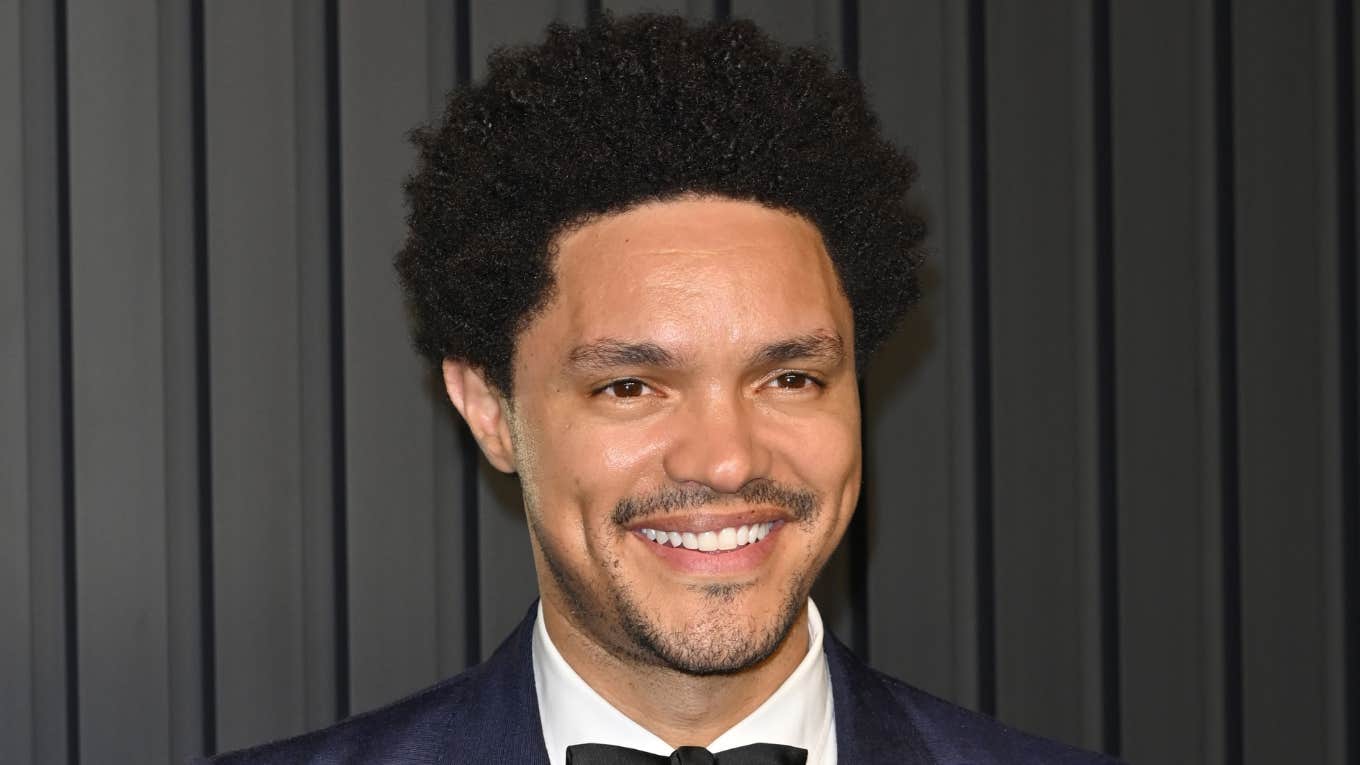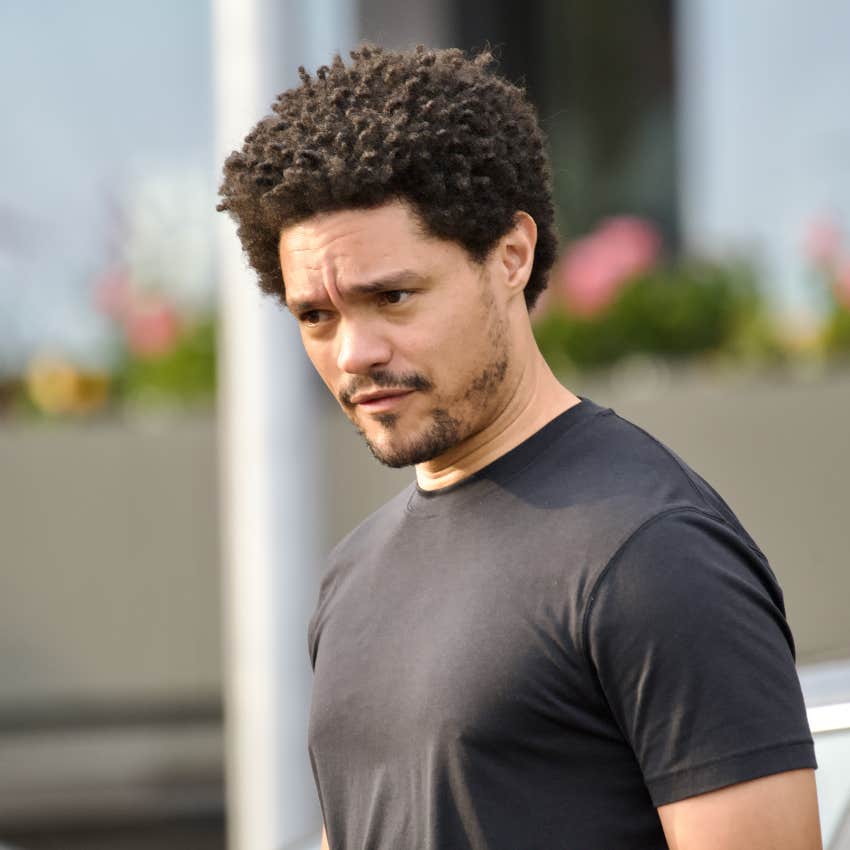Trevor Noah Breaks Down The Loss Of 'Spirited Conversations' Around Difficult Topics — 'Imagine If Discussing How To Navigate A Minefield Was As Dangerous As The Minefield Itself'
"If we cannot have conversations about difficult things, then what hope do we have of fixing the difficult things?"
 Featureflash Photo Agency / Shutterstock
Featureflash Photo Agency / Shutterstock Trevor Noah has sparked a discussion about the importance that meaningful and powerful dialogues can have between groups of people, especially when looking at how much change needs to happen not only in this country but around the world.
In a clip from his podcast, "What Now?" Noah offered up an introduction to the kinds of conversations he wants to have on his show, including the ones that most people deem "too difficult."
Trevor Noah broke down the loss of 'spirited conversations' around difficult topics.
On November 9, 2023, Noah launched his deep-dive interview show and Spotify original podcast called "What Now?" The former "The Daily Show" host announced in December 2022 that he would be stepping down from late-night talk show hosting, and many people, including me, were eager to see what the next thing would be for the opinionated and beloved comedian and commentator.
Now, three episodes in, with guests including Bill Gates, Kerry Washington, and Dwayne "The Rock" Johnson, Noah is continuing those same dynamic and interesting conversations that happened for seven years on "The Daily Show." However, in the first introduction episode to his podcast, Noah informed viewers about the exact types of discussions that not only he loved, but hoped would become a staple on his podcast.
"If there's one thing I've always loved, it's having spirited conversations," Noah said. "I've always loved how the words coming out of another person's mouth can change how the mush in our brain processes or sees the world that it's seen a certain way for such a long time."
 Photo: Liv Oeian / Shutterstock
Photo: Liv Oeian / Shutterstock
Unfortunately, Noah has noticed that these days, it seems many people have lost that ability and it's become so much harder.
He recalled being at an event a while ago and noticing people from all walks of life — women, men, young, and old. Many of these individuals, Noah noted, were having "interesting" and "dynamic" conversations, but every few minutes, he'd overhear a lot of them making disclaimers before every thought left their mouths.
Some of those phrases included, "I would never say this in public, but ..." or "I would never say this if I was being recorded, but ..." Noah admitted to finding these prefaces fascinating, especially since so many of us have spirited and engaging opinions and ideas about not only the countries we live in but the entire world as a whole.
"We are either unable, unwilling, or too scared to share [these ideas]," Noah pointed out. "And I thought to myself if we cannot have conversations about difficult things, if the conversations themselves are now the difficult things, then what hope do we have of fixing the difficult things?"
Noah likened this aversion to difficult conversations to navigating a minefield.
Providing an example, Noah acknowledged that this all reminds him of a minefield, which is considered one of the most dangerous places to ever be because you have no idea where the next explosive is, and so you're treading with careful feet and really paying attention to the next step.
"All you know is at any moment something could blow up," Noah said. "But the danger comes when you step into the minefield. Imagine if discussing how to navigate the minefield was as dangerous as the minefield itself."
Noah explained that this comparison is very similar to the times that we're living in now. He insisted that we should be more willing to talk about things that make us uncomfortable and talk to the people who make us feel that same way as well.
"Let's come to a consensus, let's walk away still fighting, but understand each other a little more. But most importantly, let's have the conservation," Noah said.
Trevor Noah is someone who routinely pushes himself out of his comfort zone and talks to people who might not necessarily align with his personal views, whether that be politically, socially, or morally.
From having people on "The Daily Show" including Tomi Lahren, Lindsey Graham, and Rand Paul, Noah often speaks with conservatives in dynamic debates that mostly end up with him providing educational and clever quips to back up why he doesn't agree with their viewpoints.
After seeing Noah's podcast clip, my mind immediately went to the state of how people interact on social media. Oftentimes, I see hordes of individuals using the excuse "Oh, I don't know enough about X topic to speak about Y issue." Now, that is a valid reason because we should never be speaking out and contributing to a social discourse if we're not educated about the issue at hand.
However, there is a level of privilege in that excuse as well. If you keep using that phrase over and over again to absolve yourself of having to learn about social issues that aren't happening in your own backyard, then you're part of the problem.
Education is free. The internet is free. There are so many activists and organizations out there that won't hesitate to provide you with useful resources, including movies, podcasts, books, essays, and so much more.
Living in ignorance is a large part of privilege, and many people aren't afforded that luxury, especially those living in marginalized communities because staying educated is often our key to survival.
We shouldn't be afraid to speak up and have these dynamic conversations, and in a similar vein, we should all be working harder to create safe and inclusive spaces where voices from all corners of this planet can be heard, even if we don't necessarily agree with these things personally.
There is power in gaining knowledge of how another person's mind works and the thoughts and ideas that they might have and can bring to the table. As Noah perfectly stated in his video, how can we expect to change the way things are if we aren't willing to put in the work to do so?
Nia Tipton is a Chicago-based entertainment, news, and lifestyle writer whose work delves into modern-day issues and experiences.

